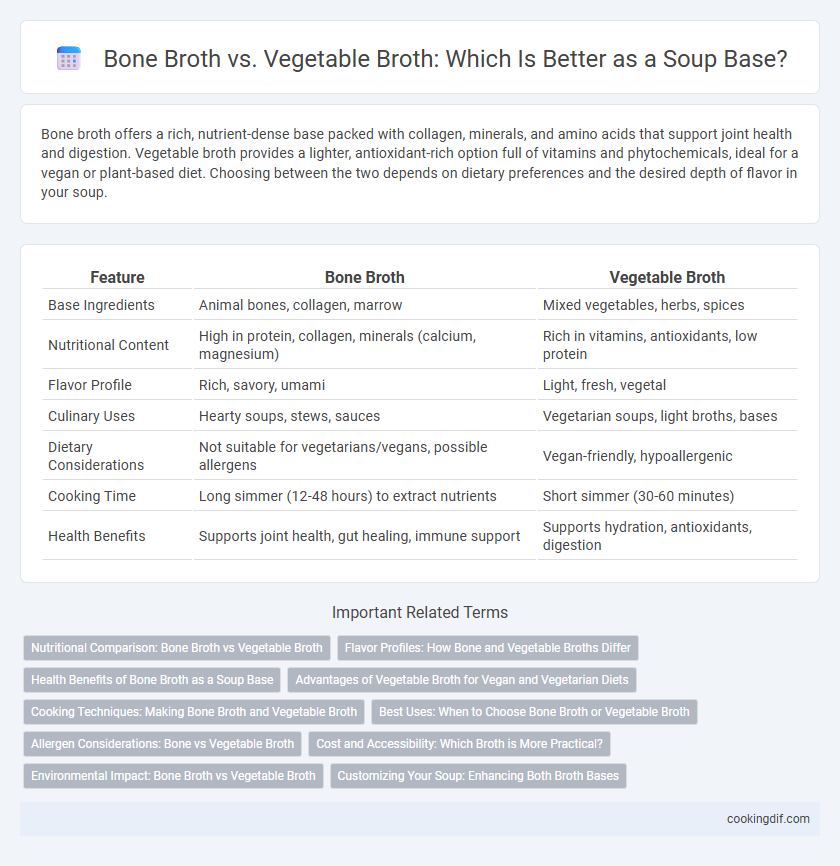Bone broth offers a rich, nutrient-dense base packed with collagen, minerals, and amino acids that support joint health and digestion. Vegetable broth provides a lighter, antioxidant-rich option full of vitamins and phytochemicals, ideal for a vegan or plant-based diet. Choosing between the two depends on dietary preferences and the desired depth of flavor in your soup.
Table of Comparison
| Feature | Bone Broth | Vegetable Broth |
|---|---|---|
| Base Ingredients | Animal bones, collagen, marrow | Mixed vegetables, herbs, spices |
| Nutritional Content | High in protein, collagen, minerals (calcium, magnesium) | Rich in vitamins, antioxidants, low protein |
| Flavor Profile | Rich, savory, umami | Light, fresh, vegetal |
| Culinary Uses | Hearty soups, stews, sauces | Vegetarian soups, light broths, bases |
| Dietary Considerations | Not suitable for vegetarians/vegans, possible allergens | Vegan-friendly, hypoallergenic |
| Cooking Time | Long simmer (12-48 hours) to extract nutrients | Short simmer (30-60 minutes) |
| Health Benefits | Supports joint health, gut healing, immune support | Supports hydration, antioxidants, digestion |
Nutritional Comparison: Bone Broth vs Vegetable Broth
Bone broth is rich in collagen, gelatin, amino acids like glycine and proline, and minerals such as calcium, magnesium, and phosphorus, which support joint health and skin elasticity. Vegetable broth offers higher antioxidants, vitamins such as vitamin C and K, and dietary fiber, promoting immune function and digestive health. While bone broth provides greater protein content, vegetable broth delivers more plant-based nutrients and lower calories, catering to different dietary needs.
Flavor Profiles: How Bone and Vegetable Broths Differ
Bone broth offers a rich, savory flavor with deep umami notes derived from the collagen and marrow of simmered bones, creating a robust and hearty base. Vegetable broth provides a lighter, fresher taste profile, emphasizing bright, aromatic flavors from herbs, vegetables, and spices, making it ideal for delicate or plant-based dishes. These distinct flavor differences influence soup complexity and mouthfeel, with bone broth delivering a fuller, more gelatinous texture compared to the clean, crisp essence of vegetable broth.
Health Benefits of Bone Broth as a Soup Base
Bone broth contains collagen, gelatin, and amino acids like proline and glycine, which support joint health, skin elasticity, and gut healing more effectively than vegetable broth. It is rich in minerals such as calcium, magnesium, and phosphorus, essential for bone strength and cellular functions. The nutrient density and anti-inflammatory properties of bone broth make it a superior base for soups aimed at enhancing overall wellness and recovery.
Advantages of Vegetable Broth for Vegan and Vegetarian Diets
Vegetable broth offers a plant-based, nutrient-rich alternative ideal for vegan and vegetarian diets, as it contains no animal products, supporting ethical and dietary choices. It is naturally lower in fat and cholesterol while providing essential vitamins, minerals, and antioxidants from diverse vegetables like carrots, celery, and onions. Versatile in flavor, vegetable broth enhances soups without overpowering other ingredients, making it suitable for a wide range of plant-based recipes.
Cooking Techniques: Making Bone Broth and Vegetable Broth
Bone broth requires long simmering times of 12 to 24 hours to extract collagen, minerals, and amino acids from bones, often combined with vinegar to help break down connective tissues. Vegetable broth is typically cooked for a shorter period, around 30 to 60 minutes, to preserve the fresh flavors and nutrients of the vegetables, such as carrots, celery, onions, and herbs. Using gentle simmering avoids cloudiness in both broths, while skimming impurities ensures a clearer, cleaner base for soups and stews.
Best Uses: When to Choose Bone Broth or Vegetable Broth
Bone broth is ideal for recipes requiring rich, gelatinous texture and deep umami flavors, making it perfect for slow-cooked soups, stews, and dishes needing collagen benefits. Vegetable broth suits lighter soups, vegetarian or vegan meals, and recipes emphasizing fresh, clean flavors without animal products. Choose bone broth for nutrient density and heartier profiles, while vegetable broth enhances subtle vegetable-based dishes and complements diverse dietary preferences.
Allergen Considerations: Bone vs Vegetable Broth
Bone broth, derived from animal bones, contains proteins like collagen and gelatin that may trigger allergies in individuals sensitive to animal products or specific proteins, while vegetable broth often avoids these allergens but might include common allergenic vegetables like celery or carrots. Vegetable broth provides a hypoallergenic base option suitable for vegan or vegetarian diets, reducing the risk of reactions related to animal-derived ingredients. Careful ingredient labeling and awareness of common allergens such as soy or gluten in veggie broth blends are essential to ensure safety for those with food sensitivities.
Cost and Accessibility: Which Broth is More Practical?
Bone broth typically costs more due to the time-intensive preparation and the price of quality bones, making it less accessible for budget-conscious consumers. Vegetable broth offers a more affordable and widely available option, with inexpensive ingredients like carrots, onions, and celery that can be sourced easily from most grocery stores. For practical purposes, vegetable broth delivers greater cost-effectiveness and accessibility, while bone broth may appeal to those willing to invest in its nutritional benefits.
Environmental Impact: Bone Broth vs Vegetable Broth
Bone broth has a higher environmental footprint due to livestock farming's resource-intensive nature, including significant water use, greenhouse gas emissions, and land requirements. Vegetable broth production is more sustainable, relying on plant-based ingredients that demand fewer resources and generate lower carbon emissions. Choosing vegetable broth as a base supports reduced environmental impact and promotes eco-friendly cooking practices.
Customizing Your Soup: Enhancing Both Broth Bases
Bone broth offers rich collagen and minerals that deepen soup flavor and improve nutritional value, while vegetable broth provides a lighter, antioxidant-rich base perfect for plant-based diets. Customizing your soup with herbs, spices, and aromatics can enhance the savory notes of bone broth or the fresh, earthy flavors of vegetable broth. Balancing these additions with the broth base ensures a well-rounded, flavorful soup tailored to dietary preferences and desired taste profiles.
Bone Broth vs Vegetable Broth for base Infographic

 cookingdif.com
cookingdif.com